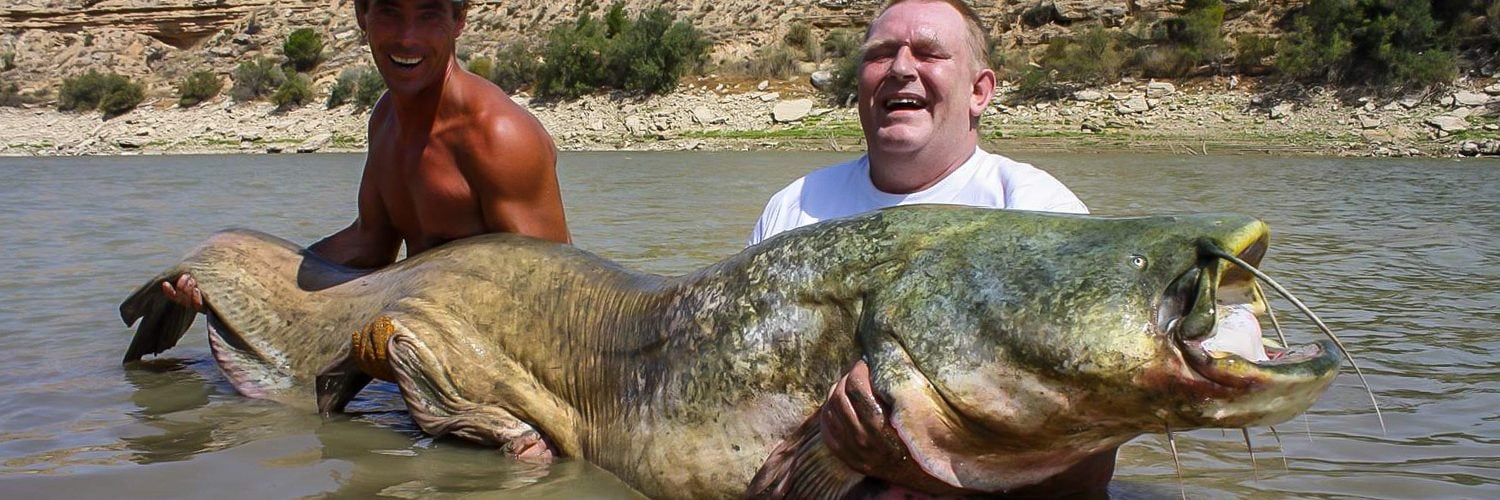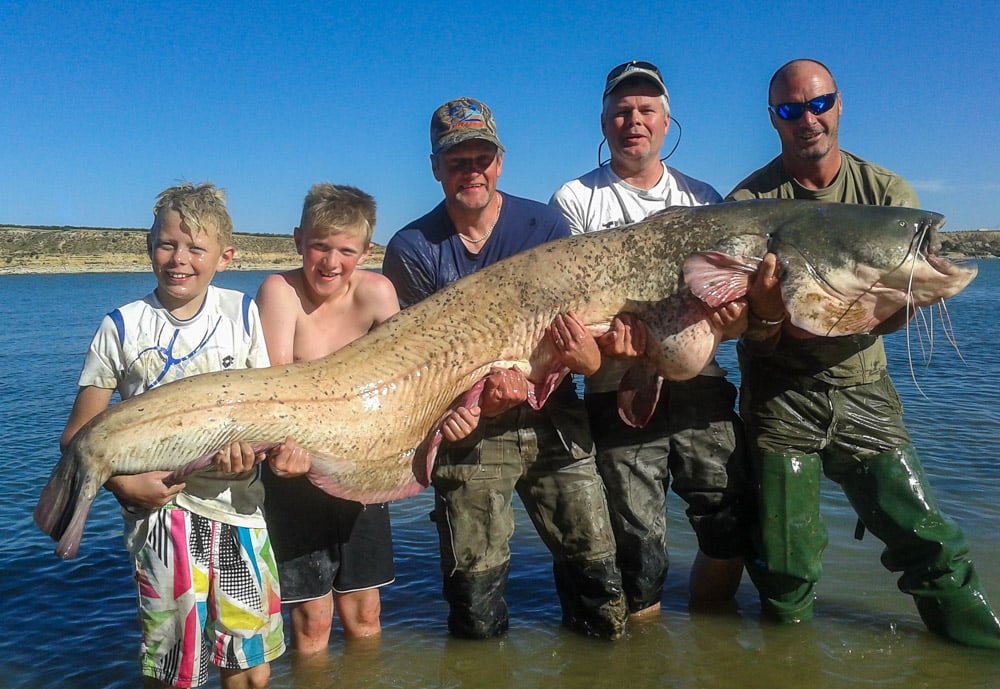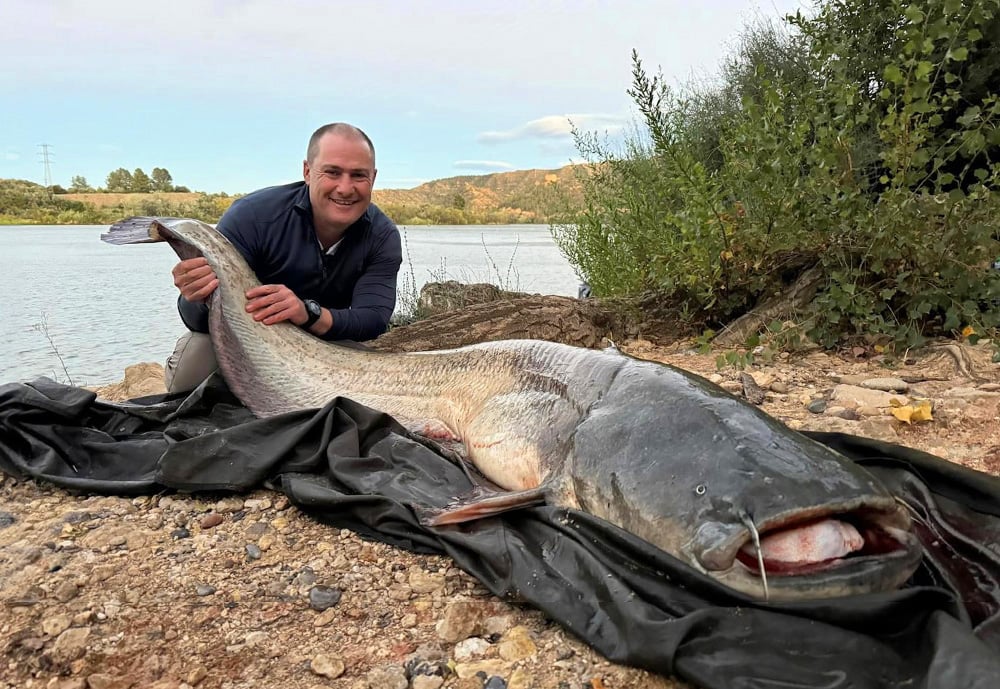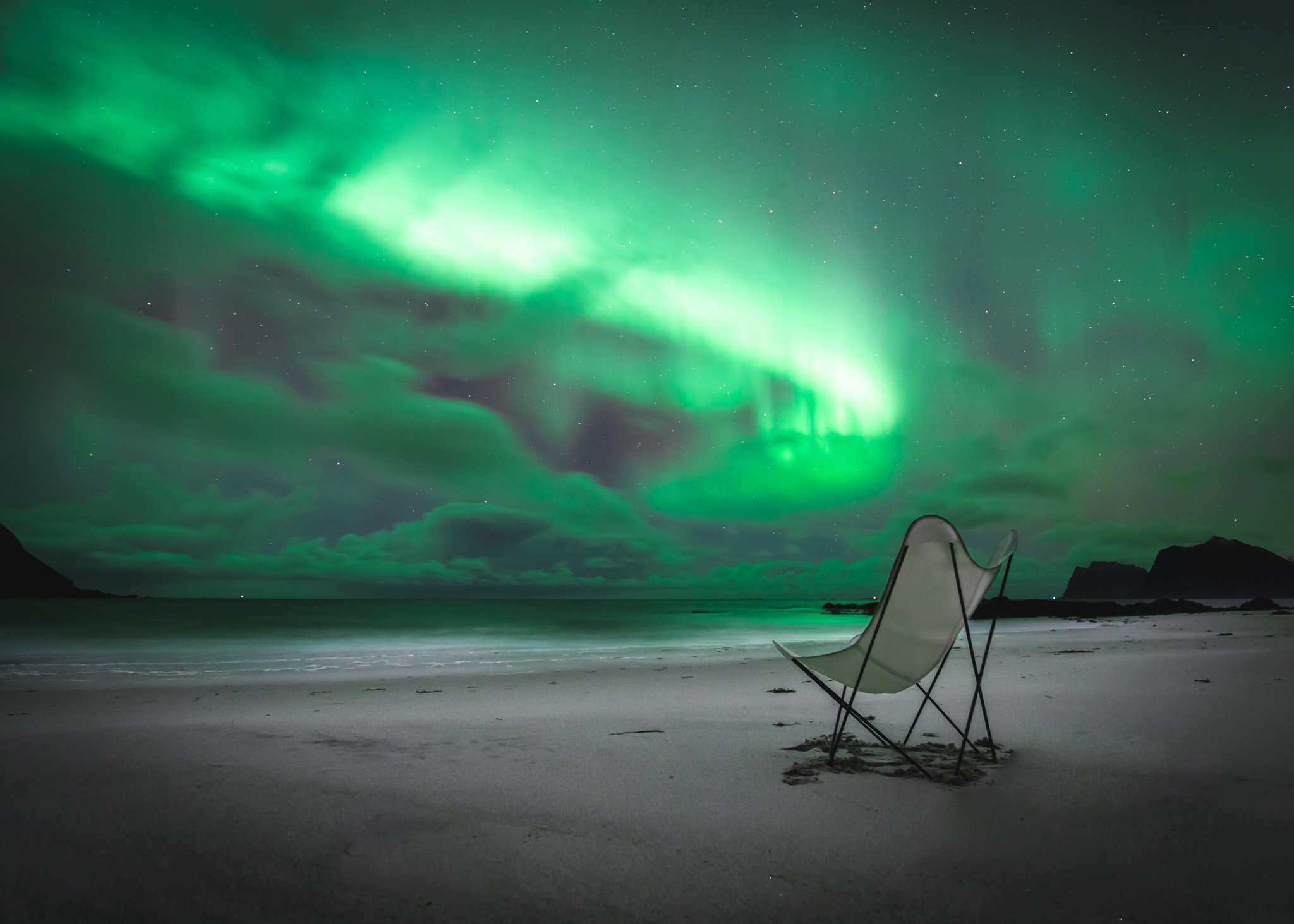

The Wels Catfish is native to wide areas of central, southern, and eastern Europe and the largest freshwater fish found on the continent. It is a freshwater fish recognizable by its broad, flat head and wide mouth. Inhabiting large, warm lakes and deep, slow-flowing rivers, it prefers sheltered locations and loose structure.
Like most freshwater bottom feeders, juvenile and small Catfish feed on a range of worms, insects and crustaceans, but the bigger fish have a diet of other fish. The really big specimens have been observed eating other prey, such as frogs, rats and even aquatic birds such as ducks. The Catfish are renowned for their vast bucket like mouths, and although they don’t have traditional teeth, they have robust sets of sandpaper-like pads used to crush anything which gets in its way. Wels Catfish can live for over fifty years and grow to some epic proportions. On the mighty river Ebro in Spain, the Catfish capital of Europe, fish to over 200lb are regularly hooked and landed by anglers, and fish averaging 80lb are commonplace.
The Wels Catfish is a name on many freshwater anglers bucket lists because of its sheer size and powerful fighting qualities. The species can be targeted and caught on many different tactics and baits, but the most popular way to catch them is ledgering live or dead baits over a bed of loose fed pellets. Using a big string of pellets on the hook can also prove effective, but Carp will often eat them before the Catfish gets a chance.
Below are the top destinations in the world for Wels Catfish Fishing.


Ever dreamt of doing battle with one of the hardest fighting freshwater beast on the planet? Well, now is your chance, as we are offering Catfishing at its best. Imagine standing on the side of a huge fast running river holding on to a very angry Catfish as it tries to get back to its hole? As you can imagine, it is an experience not to miss!


If you’re looking for a family fishing holiday, our River Ebro Villa in Spain will tick all the right boxes. Ideal for large families or groups of friends, it gives travelling anglers a chance to fish for an array of hard-fighting species, including Catfish, Carp, Zander and Perch, and provides non-anglers with a range of fantastic amenities and activities.


Average Customer Satisfaction Score 94%


Species: Wels Catfish
Scientific Name: Siluris Glanis
Also known as: Kittens, Moggies, Slugs
The Wels Catfish is an easily recognisable fish; its eel-like elongated body shape, small fins, tiny eyes, cavernous mouth and large barbells are unmistakable. Its slimy skin varies in colour depending on its environment; those living in clear water often take on a blackish colour, while those living in muddy water often take on a green-brown colour. The underside is always pale yellow to white.
They are a long-lived species and have been known to reach ages of 70+, reaching maturity around 4-5 years. For anglers, they are one of the largest freshwater fish you can encounter, especially in Europe. Most adult fish measure between 1.5m and 2m (around 50lb to 60lb), and fish over this size are not unusual.
A bottom feeder, the Wels Catfish primarily starts its life feeding on worms, insects, crustaceans and small fish, but they will take larger prey as they grow. Adult fish have been witnessed eating frogs, snakes, rats, voles, coypu, aquatic birds, and even cannibalising other Catfish. As they don’t have what you’d classify as traditional teeth, they have abrasive pads, which they use to clamp onto their prey and swallow whole. With poor eyesight, they rely on their hearing and smell to hunt prey, along with their long barbells, which help detect movement.
Fact: In 2012, researchers at the University of Toulouse in France documented Wels Catfish lunging out of the water to feed on pigeons at the water’s edge. 28% of the beaching behaviour observed and filmed in this study were successful in bird capture.
Wels Catfish are native to vast areas of central, southern, and eastern Europe, in the basins of the Baltic, Black and Caspian Seas. They have also been introduced to Western Europe as prized sport fish and are now found in the United Kingdom, from east to Kazakhstan and China and south to Greece and Turkey.
They enjoy large, warm lakes and deep, slow-flowing rivers, preferring to remain in sheltered locations like holes in the riverbed and amongst sunken trees. The River Ebro in Spain, especially the Caspe Region, is one of the most prolific waterways in the world, providing Wels Catfish with the perfect habitat to thrive, grow and establish a vast population. For anglers, the Ebro is famed as one of the best locations in the world for Catfish, and each year, anglers visit in huge numbers, looking to battle specimens of over 200lb.
Our top Catfish fishing destinations:
Catfishing Holidays River Ebro Spain
River Ebro Fishing Villa Spain
Other top locations for these excellent fighting fish are the River Po in Italy, which currently holds the world record for Wels Catfish, and the Volga River in Russia. In the UK, they can be found in many lakes.
The Wels Catfish is a famous quarry amongst anglers and can be targeted from the bank or boat. While they can be caught on lures and float-fished live baits, one of the most popular and effective ways to fish for them is by ledgering over large beds of bait like Halibut Pellets and Boilies.
When fishing for Catfish on the River Ebro in Spain, sacks of boiles and pellets are traditionally boated to the middle of the river and then spread over a medium-sized area. Baited rigs are cast or positioned over the top and fished from the bank on bite alarms.
Due to the size of the fish and the nature of the river, it’s essential to use strong, robust tackle, as when you hook a specimen-sized Wels Catfish and battle it in the heavy flow, it will exploit any weakness. Rig-wise, it’s best to keep things simple, and a standard running lead set-up and hair-rig baited with several pellets will generally suffice.
Tip: When fishing at our destination on the River Ebro, we recommend using one slightly more refined set-up as the river holds a good number of Carp, and it’s not unusual to encounter fish to over 40lb mixed in with the Catfish.
Wels Catfish vary in size depending on where you are fishing. In lakes in the UK, they average between 20-40lb, whereas on the river Ebro in Spain, they will be between 50-80lb. At our destination in the Caspe region, fish of over 100lb get landed regularly, and fish over 200lb are not unusual.
The heaviest authenticated specimen, captured from the river Po by a Hungarian fisherman in 2010, weighed 297.6lb, although there are recent anecdotal reports of larger fish exceeding 300lb.











